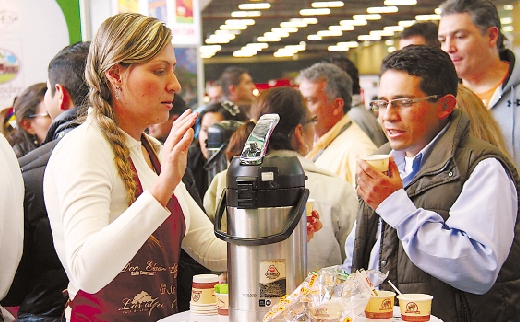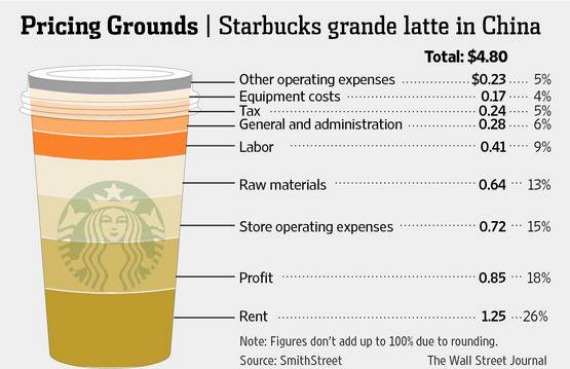Coffee may become a luxury in the future. Can new products be cultivated to cope with the coffee crisis?

Visitors sip coffee at the Colombia International Coffee Show. (Source: Xinhua Agency)
China Daily News, August 7 (Xinlian) According to the British Broadcasting Corporation (BBC), when we drink latte or Italian coffee while reading newspaper headlines, we do not feel that climate change is a big threat. But travel thousands of miles to the coffee's original home and you can really feel the threat of extreme weather to coffee farming. The global coffee growing industry is experiencing drought, heavy rains and pest crises caused by global warming, and has to face problems such as reduced coffee production and rising costs caused by these problems. The researchers point out that as climate problems worsen and rainforest conservation increases, coffee prices will eventually rise. In the future, coffee, once familiar and loved by consumers all over the world, may become a luxury that ordinary people cannot consume.
Extreme weather causes coffee production to drop sharply
Elisa Frank, a researcher at the University of California, Santa Barbara, recently interviewed coffee farmers in Chiapas, Mexico. The coffee plantations they tend to are now often flooded by rain after heavy downpours, compared with the milder rains of the past. A coffee grower told Frank,"We didn't get this much rain when we were kids. Coffee leaves and cherries are falling because of the wind and rain, and coffee production is reduced."
Coffee farmers here used to enjoy a stable and mild climate. But temperatures are either cold enough to stop coffee growing or hot enough to dry the berries before they can be picked. Hurricanes and mudslides are frequent, and sometimes the mud can obliterate entire plantations. As one coffee farmer put it,"The weather is getting strange. Something never happens before."
These problems are not limited to Mexico alone; coffee farmers in South America, Asia and Africa are also witnessing droughts, heavy rains and pests leading to reduced yields as a consequence of global warming. The consequences of climate change will travel through the entire industrial chain and eventually reach cafes all over the world. The world consumes 2 billion cups of coffee a day, but how do you ensure adequate coffee supplies when the crop is ravaged by extreme weather and production declines?
Coffee tastes are becoming more refined. There are two main varieties of commercial coffee beans: Arabica coffee and Robusta coffee. The former has a strong aroma and the latter has a stronger bitterness. Arabica coffee beans have become a favorite among consumers worldwide because of their complex multi-layered taste, accounting for 70% of the coffee beverage market. Almost all commercial Arabica coffee trees are introduced from a small number of coffee plants in the Ethiopian mountains, which makes it low in genetic diversity and highly vulnerable to climate change. The Arabica coffee tree grows best in relatively mild temperatures, adapting to a narrow range of temperatures between 18 and 20 degrees Celsius, and requires moderate and regular rainfall to grow. "It has very specific climate requirements," says Kristin Boone of Humboldt University in Berlin."You can only find a few places around the world where it can grow."
The delicate Arabica coffee tree will not adapt to the vagaries of global warming. "Coffee trees bloom for only 48 hours," explains Einhall Megrah of the Institute of Terrestrial Ecology at the Federal Institute of Technology Zurich."If something unexpected happens during flowering, such as a big storm, the whole crop is destroyed."
Elsewhere, drought is a problem.
In a disturbing sign, coffee rust wreaked havoc on farms in Nicaragua last year.
Coffee sellers in Uganda's Rwenzori Mountains complain that drought and high temperatures have caused flowers to drop before they can bear fruit. Even when they bloom, the beans are shriveled and small. The coffee tree's natural enemies-pests and diseases-thrive in extremely hot weather, which causes even more trouble. The former such as leaf miner, coffee fruit beetle, mealy scale insect, the latter such as leaf rust and insect pests all have an impact on coffee production. During the latest epidemic, coffee trees in Central America were affected by leaf rust, and the 2013 harvest fell by 20%. And as the climate gets warmer, such disasters are likely to become more common.
Coffee is a luxury in the future.
A team of researchers looking at Tanzania's coffee production since the 1960s found that crop yields have fallen from a peak of 500 kilograms per hectare that year to just 300 kilograms today. The decrease in coffee crop yields was strongly correlated with a 0.3 ° C rise in local temperatures every 10 years and an associated decrease in rainfall.
The area of land suitable for growing Arabica coffee trees could halve by 2050, researchers predict based on the latest data on global climate change. Traditional coffee-producing regions such as Vietnam, India and much of Central America will be hit harder.
As technology advances and productivity increases, other crops will become cheaper and cheaper, and coffee prices will change dramatically. Coffee could become a luxury by 2050, with prices rising nearly 50%. Coffee farmers are less likely to benefit from coffee cultivation because of higher costs. Many coffee growers may choose to switch to crops with more stable harvests. "When we showed the results to coffee makers, they told us that this was true," the researchers said."People in low-altitude Central America, for example, had abandoned coffee production and switched to rubber farming."
Can new products cope with the coffee crisis?
Others worry that human efforts to tackle these problems will backfire and cause even more serious environmental problems.
People from other regions might consider joining the coffee growing business because it is profitable, but it would do great harm to the environment. The researchers mapped out suitable areas for Arabica coffee cultivation and found that 2.2 million hectares of tropical rainforest would need to be eaten to meet projected demand for coffee, exacerbating biodiversity loss.
There may be other solutions. Robusta coffee has strong tolerance and is better able to adapt to these changes. But this assumes that consumers can grow to love the bitter taste of Robusta coffee.
In the future, the researchers suggest that food labels should indicate whether coffee beans are grown in ecologically fragile areas, so consumers are aware of the environmental costs and can consume more civilly.
Others hope to secure coffee supplies by improving cultivation techniques. Coffee & Environment is bringing coffee producers from more than 20 regions together to brainstorm ways to tackle the challenges ahead. One option is to graft arabica coffee trees onto the roots of robusta coffee trees, creating a hybrid that retains the aroma and is better able to withstand drought. Alternatively, selective breeding can be used to create a hybrid of Arabica and Robusta.
"People are working in that direction, but we're not sure when we'll be able to breed new varieties," the researchers said.
Finding a solution soon is critical to the livelihoods of coffee farmers and other coffee traders, a group estimated by one survey to number at least 25 million people. Coffee farmers around the world now face daily uncertainty, and it's excruciating.
Although many coffee farmers listen to the weather forecast every day and try to prepare for the coming downpour, they still feel helpless and helpless as they watch the storm destroy their fruit. Some coffee farmers feel the weather has become almost a taboo topic. One coffee farmer said: "We don't talk about climate very much. We knew it was going to be like this, and there was nothing we could do about it."
(Editor: Qi Lei Lv Bing)
Important Notice :
前街咖啡 FrontStreet Coffee has moved to new addredd:
FrontStreet Coffee Address: 315,Donghua East Road,GuangZhou
Tel:020 38364473
- Prev

Hot registration for the 2015 China Coffee Federation Cup Coffee Brewing Competition in Guangdong, Hong Kong and Macao!
The China Coffee Federation Cup Coffee Brewing Competition was set up in Beijing, Shanghai, Guangdong, Hong Kong, Macao and other places. On September 10, 2015, the Guangdong-Hong Kong-Macao Competition was held at Pazhou China Import and Export Commodity Fair Hall 3.1 in Guangzhou. Registration is now accepted! China Coffee Alliance (CCL), a simple but full of weight, is a large collection of coffee industry. Not only to be successful.
- Next

What is the price of Starbucks in China?
[Starbucks: high price because guests stay for hours] Calver, president of Starbucks China and Asia Pacific, explained that Starbucks China Cafe is much larger than the United States, because most Chinese customers like to stay in the store for a few hours, while 80% of American customers leave as soon as they get the coffee. Imagine if one day you walked into Starbucks and found a large cup.
Related
- What brand of black coffee is the most authentic and delicious? what are the characteristics of the flavor of the authentic Rose Summer Black Coffee?
- Introduction to the principle and characteristics of the correct use of mocha pot A detailed course of mocha pot brewing coffee is described in five steps.
- Which is better, decaf or regular coffee? how is decaf made?
- How much is a bag of four cat coffee?
- How about four Cat Coffee or Nestle Coffee? why is it a cheap scam?
- Which is better, Yunnan four Cats Coffee or Nestle Coffee? How about cat coffee? is it a fake scam? why is it so cheap?
- How about Cat Coffee? what grade is a hoax? which instant coffee tastes better, four Cat Coffee, Nestle Coffee or G7 coffee?
- Process flow chart of coffee making-Starbucks coffee making process what coffee tastes good at Starbucks
- The top ten best coffee beans in the world Rose summer coffee or Tanzanian coffee tastes good
- Yunnan four cat coffee is good to drink?_four cat coffee is a big brand? four cat blue mountain coffee is fake?

